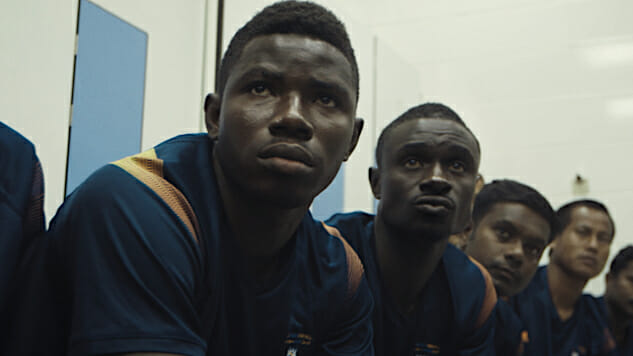The Complicated Relationship Between Life and Sport Turns Harrowing in First The Workers Cup Trailer
Images via The Workers Cup LLC
“The gods had condemned Sisyphus to ceaselessly rolling a rock to the top of a mountain, whence the stone would fall back of its own weight. They had thought with some reason that there is no more dreadful punishment than futile and hopeless labor,” writes Albert Camus in The Myth of Sisyphus. Like Sisyphus has his rock, we all carry a burden related to labor in some sense, but no one’s “rock” weighs as heavy as the one placed on the workers in the labor camps of Qatar.
Replace the gods that punished Sisyphus with the construction companies contracted to build the stadiums for the 2022 World Cup in Qatar, and swap Sisyphus for the thousands of migrant workers who seek payment and purpose by way of building the stadiums that showcase their favorite sport on a scale previously unbeknownst to them. That is where the trailer for Adam Sobel’s debut documentary The Workers Cup begins. “People come here to fulfill their dreams” is said as the trailer begins and, slowly but surely, reality warps that dream into a labor-exploitative nightmare. The workers know this, but they work on; the big companies know exactly who they are exploiting and why, and yet, they exploit on—profit and deadlines being their sole drives.
Trapped, broken and let-down, the workers seek better lives through building something they love in a quasi-religious sense but don’t find the joy they were looking for. An executive says, “They are coming with too much hope,” but why shouldn’t they leave home in search of hope and purpose? The World Cup is the great equalizer in the world of sport and in the minds of these men, they play a small but pivotal role in shaping the canvas for the world’s biggest and arguably most important sports showcase. Yet, hope isn’t found in the cracked concrete underneath a jack-hammer, nor is it found in the barracks these workers sleep in—it is found on the soccer field. The smell of grass, the calling of a play and the uptick in one’s heart rate as they attempt a shot on the opposing team’s goal is what these people love. It fuels them. It gets them through their impossibly hard days full of thankless labor that teeters on indentured servitude.
-

-

-

-

-

-

-

-

-

-

-

-

-

-

-

-

-

-

-

-

-

-

-

-

-

-

-

-

-

-

-

-

-

-

-

-

-

-

-

-








































